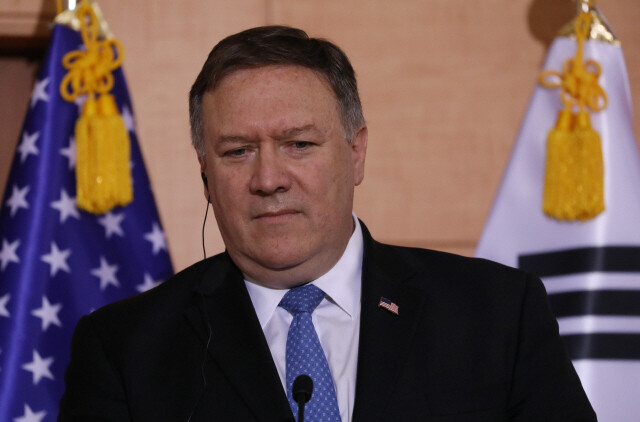hankyoreh
Links to other country sites 다른 나라 사이트 링크
Pompeo says there’s no “timeline” for North Korea’s denuclearization

US Secretary of State Mike Pompeo said he does not plan to “put a timeline” on North Korea’s denuclearization. Contrasting with his past position standing the end of President Donald Trump’s current term in 2020 as a de facto denuclearization deadline, the remarks have triggered speculation that the North Korea-US denuclearization talks have entered a “regrouping” stage.
“I am not going to put a timeline on [denuclearization], whether that's two months [or] six months,” Pompeo said in a telephone interview with CNN on his two-month anniversary as Secretary of State on June 25.
“We are committed to moving forward in an expeditious moment to see if we can achieve what both leaders set out to do,” he added.
Pompeo also suggested it was too soon to expect a concrete road map, with the summit coming just two weeks ago after decades of North Korea-US tensions.
Pompeo’s remarks about not setting a timeline differs substantially with reports the previous day from an unidentified South Korean Ministry of National Defense official, who was quoted as saying specific demands and a timeline would be presented to Pyongyang. Pompeo himself said in a June 13 press conference that the US was “hopeful” that it could achieve “major disarmament [. . .] in the [next] two-and-a-half years.”
Pompeo’s remarks about not imposing a specific timeline – while continuing to insist on swift denuclearization – were seen as an attempt to avoid giving the appearance of pressing Pyongyang too much ahead of future talks. It could also be read as an acknowledgement of the technical unlikelihood of achieving “major denuclearization” within the two-and-a-half years remaining in Trump’s current term.
Another consideration may have been the possibility of the situation backfiring politically as a deadline is declared but not achieved. Pentagon spokesperson Dana White echoed Pompeo’s remarks in a message the same day, tweeting that the Department of Defense “remains committed to supporting the ongoing diplomatic process with the #DPRK, of which there is no specific timeline.”
Pompeo’s remarks were also read as reflecting a situation where neither North Korea nor the US has a mechanism in place for follow-up talks. According to sources, North Korea has yet to notify the US of its “counterpart” to Pompeo. Some time is expected to be needed for leader Kim Jong-un to visit China and conduct an internal assessment.
Washington is in a similar situation. The White House faces internal reorganization with the leader of the inter-agency task force to prepare for the summit, National Security Council senior director for WMD and counterproliferation Andrea Hall, returning to her original position at the Office of the Director of National Intelligence.
Reports also suggested US ambassador to the Philippines Sung Kim, who led working-level talks at the State Department, has declined to take on a role supervising nuclear negotiations with North Korea. With State Department director for Korea Mark Lambert assigned to another position some months ago, new appointments will be essential for North Korea nuclear program-related efforts to continue, source said.
For that reason, some analysts are predicting the start of follow-up negotiations or concrete denuclearization measures from North Korea could come sometime around the US Independence Day holiday on July 4. While a few US identification personnel are currently in North Korea to reclaim the remains of US soldiers, their activities are reported to be completely unrelated to denuclearization talks.
By Yi Yong-in, Washington correspondent
Please direct comments or questions to [english@hani.co.kr]

Editorial・opinion
![[Guest essay] The real reason Korea’s new right wants to dub Rhee a founding father [Guest essay] The real reason Korea’s new right wants to dub Rhee a founding father](https://flexible.img.hani.co.kr/flexible/normal/500/300/imgdb/original/2024/0423/8317138574257878.jpg) [Guest essay] The real reason Korea’s new right wants to dub Rhee a founding father
[Guest essay] The real reason Korea’s new right wants to dub Rhee a founding father![[Column] ‘Choson’: Is it time we start referring to N. Korea in its own terms? [Column] ‘Choson’: Is it time we start referring to N. Korea in its own terms?](https://flexible.img.hani.co.kr/flexible/normal/500/300/imgdb/original/2024/0423/3617138579390322.jpg) [Column] ‘Choson’: Is it time we start referring to N. Korea in its own terms?
[Column] ‘Choson’: Is it time we start referring to N. Korea in its own terms?- [Editorial] Japan’s rewriting of history with Korea has gone too far
- [Column] The president’s questionable capacity for dialogue
- [Column] Are chaebol firms just pizza pies for families to divvy up as they please?
- [Column] Has Korea, too, crossed the Rubicon on China?
- [Correspondent’s column] In Japan’s alliance with US, echoes of its past alliances with UK
- [Editorial] Does Yoon think the Korean public is wrong?
- [Editorial] As it bolsters its alliance with US, Japan must be accountable for past
- [Guest essay] Amending the Constitution is Yoon’s key to leaving office in public’s good graces
Most viewed articles
- 1[Guest essay] The real reason Korea’s new right wants to dub Rhee a founding father
- 2Terry Anderson, AP reporter who informed world of massacre in Gwangju, dies at 76
- 3[Column] ‘Choson’: Is it time we start referring to N. Korea in its own terms?
- 4Why Korea shouldn’t welcome Japan’s newly beefed up defense cooperation with US
- 5[Column] The clock is ticking for Korea’s first lady
- 6Opposition calls Yoon’s chief of staff appointment a ‘slap in the face’
- 7New AI-based translation tools make their way into everyday life in Korea
- 8[Editorial] Japan’s rewriting of history with Korea has gone too far
- 9[Reporter’s notebook] Did playing favorites with US, Japan fail to earn Yoon a G7 summit invite?
- 10[Column] The president’s questionable capacity for dialogue